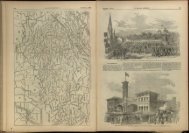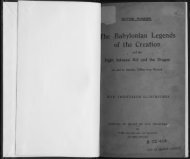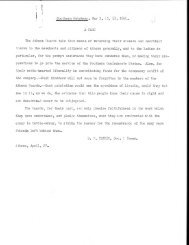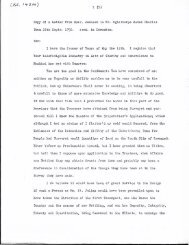THE SHE KING; OR, THE BOOK OF ANCIENT POETRY
THE SHE KING; OR, THE BOOK OF ANCIENT POETRY
THE SHE KING; OR, THE BOOK OF ANCIENT POETRY
You also want an ePaper? Increase the reach of your titles
YUMPU automatically turns print PDFs into web optimized ePapers that Google loves.
\<br />
N<br />
12 <strong>THE</strong> <strong>SHE</strong> AFTEK CONFUCIUS. <strong>THE</strong> SOURCES <strong>OF</strong> <strong>THE</strong> ODES AS A COLLECTION.<br />
digest of the differences between its text and those of the<br />
other three recensions, at the command of the emperor<br />
Ming (A.D. 58 75). Ma Yung (A.D. 69 165) followed<br />
with another commentary; and we arrive at Ch'ing<br />
Heuen, or Ch'ing K'ang-shing, who wrote his " Supple<br />
mentary Commentary to the She of Maou," and his<br />
"Chronological Introduction to the She." The former<br />
of these two Works complete, and portions of the latter,<br />
are still extant. That the former has great defects as<br />
well as great merits, there can be no question; but it<br />
took possession of the literary world of China, and after<br />
the time of Ch'ing the other three texts were little heard<br />
of, while the names of the commentators on Maou's text<br />
and his explanations of it speedily become very numerous.<br />
Maou's grave is still shown near the village of Tsun-fuh,<br />
in the departmental district of Ho-keen.<br />
5. Returning now to what I said in the 2nd paragraph,<br />
it will be granted that the appearance of three different<br />
and independent texts, immediately after the rise of the<br />
Han dynasty, affords the most satisfactory evidence of<br />
The different t^le recovery of the Book of Poetry, as it had<br />
texts guarantee continued from the time of Confucius. Untho<br />
integrity of ,, ,<br />
the recovered tortuiiately only fragments of them remain<br />
Blle' now; but we have seen that they were dili<br />
gently compared by competent scholars with one another,<br />
and with the fourth text of Maou, which subsequently<br />
got the field to itself. In the body of the larger Work<br />
attention is called to many of their peculiar readings;<br />
Thetextswere and it is clear to me that their variations<br />
^fi'iS'from from ne another and from Maou's text arose<br />
citation. from the alleged fact that the preservation<br />
of the odes was owing to their being transmitted by re<br />
citation. The rhyme helped the memory to retain them,<br />
and while wood, bamboo, and silk were all consumed by<br />
the flames of Ts'in, when the time of repression ceased<br />
scholars would be eager to rehearse their stores. It<br />
was inevitable that the same sounds, when taken down by<br />
different writers, should in many cases be represented by<br />
different characters. Accepting the text as it exists, we<br />
have no reason to doubt that it is a near approximation<br />
to that which was current in the time of Confucius.<br />
CHAPTER II.<br />
<strong>THE</strong> SOURCES <strong>OF</strong> <strong>THE</strong> ODES AS A COLLECTION; <strong>THE</strong>IR<br />
INTERPRETATION AND AUTH<strong>OR</strong>S; <strong>THE</strong> PREFACES<br />
AND <strong>THE</strong>IR AUTH<strong>OR</strong>ITY.<br />
APPENDIX A CH-EOKOLOGICAL TABLE <strong>OF</strong> <strong>THE</strong> ODES.<br />
1. IT has been shown in the first section of last chapter<br />
that the Book of Poetry existed as a collection of odes<br />
before the time of Confucius. It becomes a question of<br />
some interest whether we can ascertain how the collection<br />
came to be formed, and account for {he gaps that now<br />
exist in it, how there are no poetical memorials at<br />
all of several of the reigns of the Chow kings, How wore the<br />
and how the first Part embraces only a por- tii^nr<br />
tion of the States of which the kingdom was g ^<br />
Composed. incomplete?<br />
2. Sir Andrew Fletcher of Saltoun tells us the opinion<br />
of " a very wise man," that " if a man were permitted to<br />
make all the ballads of a nation, he need not care who<br />
should make its laws/' 1 The theory of Chinese scholars<br />
is, that it was the duty of the kings to make themselves<br />
acquainted with all the odes and songs current in the<br />
different States, and to judge from them of The theory of<br />
the character of the rule exercised by their Sbout^a^oUec-<br />
several princes, so that they might minister fo^govenTment-<br />
praise or blame, reward or punishment, ac- ai purposes.<br />
cordingly.<br />
1 See Fletcher's account of " a Conversation on Governments." Sir<br />
John Davis (The Poetry of the Chinese, p. 3o) adduces the remark of a<br />
writer in the Spectator (No. 502) : " I have heard that a minister of<br />
State in the reign of Queen Elizabeth had all manner of hooks and<br />
ballads brought to him, of what kind soever, and took great notice how<br />
much they took with the people ; upon which he would, and certainly<br />
might, very well judge of their present dispositions, and of the most<br />
proper way of applying them according to his own purposes."








